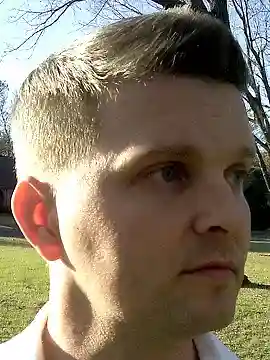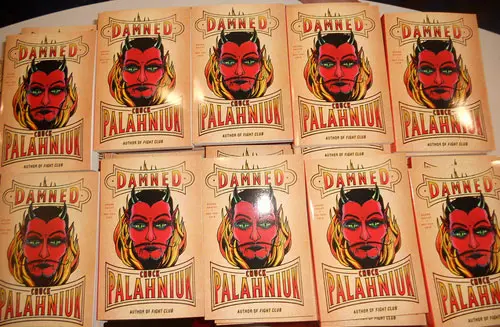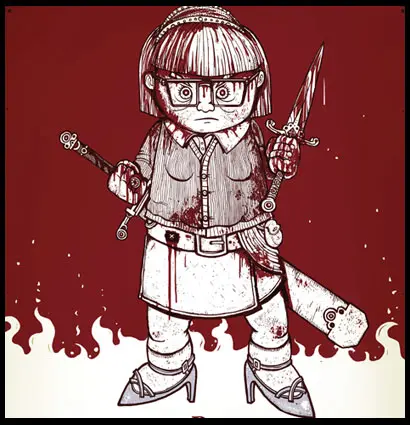Any excuse to go to Portland is a good excuse. It has beautiful weather (this day was a sunny 73 degrees), great restaurants (I recommend the chicken fried sweetbreads at Merriwether's), Willamette Valley Pinot Noir, and Powell's - the best bookstore ever. Oh, and it doesn't hurt that I got to have dinner with Chuck Palahniuk while I was there, either. As if that wasn't exciting enough, he also invited me to accompany him to his weekly writer's workshop.
So after the aforementioned dinner we drove over to the workshop, and after the workshop was over I had the privilege of conducting a one-on-one with our beloved Chuck, the deviant little author who provokes deeper thought by way of an engaging read. But the sign of a great writer and a great book- and both Chuck and Damned inhabit the intersection of that particular Venn diagram- isn’t just about being clever, about teaching us something. It's about giving us a piece of the author as well. Chuck himself said that all fiction is autobiographical. Damned, due 10/18/11, proves his point completely:
KC: Gotta get this question out of the way: What has Judy Blume said about this, if anything at all? “Thanks for the new demographic of sales?”
CP: As far as I know Judy Blume is either unaware of this reference/homage or she is not troubled by it, but she’s always been an advocate of free speech, so I doubt she’d take offense.
KC: So this is the first of the books you wrote while at your mother’s bedside, yes? Was it three in a year? I’m not sure where I read that, but is that right?
CP: Well no, I finished Tell-All and wrote Damned in two years total. A year while Mom was sick, and a year beyond her death. A year for the first draft and another year for the second.
KC: The book reads like a reaction to the whole horrible process of witnessing the death of a loved one, especially one that's so protracted. Without sounding too presumptuous, I can’t imagine this book being written without the backdrop of the tragedy you were witnessing, up close and personal as it were. What I mean to say is, so many people don't get that kind of time and attention and closeness with their loved ones as they die. Some only hear about it from a phone call, some only get 12 hours. Neither situation is ideal of course, but it seems to me that your prolonged, drawn-out witnessing of your mother’s death, versus say your father’s quick and untimely one, would present itself as a ground ripe for writing such a book. Lullaby notwithstanding.
CP: Well, part of the joy of being a writer is that I can do my job anywhere. My siblings had jobs that kept them where they had to live, but I could go and be at her side. And really it wasn’t until the night my mother died that I called my sister and said ‘I have a really bad feeling, would you come over here?’ So my sister came over and she spent the day. We helped my mother pay bills. She wanted them paid, she was lucid enough that she was writing checks. We spent the whole day together, and my sister decided to stay over for the evening. In the morning, my mother’s alarm clock went off and woke us both up, and that’s when we discovered she was dead. It was shocking because she hadn’t set that alarm in over a year. My sister just happened to be there that night, so nobody had to endure it by themselves. And the ritual of paying bills before you die, it is so archetypal, so classical and extraordinary that you would settle accounts six hours before you died, that’s completely… Something really perfect about that.
KC: Damned is the first in a two part or three part work?
CP: Three parts. They’re based on The Divine Comedy. Damned is Hell, Purgatory is right next to me (Chuck pats a blue-bound copy resting against his hip) and Heaven is the next installment.
KC: The book frequently mentions the “addiction to hope”. What does hope mean to you?
CP: [Laughs – then a long pause] Basically, well, the… [another long pause] Hope is the abstract, in Madison’s case. But when you boil it down to physical actions or what hope represents - there really is a kind of “I hope therefore I am” equivalency that life is hope – I’m sorry that’s a tough one, I can’t really put that one in words.
KC: It’s okay, I think you answered my question perfectly. How strong was your hope that things would get better, that things might just this once reverse themselves? Do you see that as your state of mind as you were writing Damned? This kind of defiant rejection of hope? We all have a hope against odds, and to me some of that was manifested in Madison.
CP: Madison’s awareness is continual, is relief: it disempowers the bleakness of her situation. This is why ghost stories are so popular. Ghost stories aren’t just a spooky thing…
KC: They give us hope beyond death.
CP: Exactly. The heart and soul of Wuthering Heights isn’t just a spooky story, but is strongly entrenched in the proof that love exists beyond death. It’s a ghost story/love story. Ultimately it is romantic. I think the same kind of thing is happening in Damned. While it is spooky or unpleasant on the surface, it proves the existence of love beyond mortality.
KC: Something that can’t be touched.
CP: Exactly.
KC: Did you model the Spencers off of any family in particular?
CP: [Laughs] Yes, entirely, but I’m not going to say who.
KC: [Laughs] We have our theories. Can you speak more on your equating a behavioral therapist to a priest? Where did that come from?
CP: Monica and I were researching something called Fasting Girls, a movement in the late 19th century where these girls had what we would today call anorexia nervosa. They wouldn’t eat for months at a time and they wasted away to these living skeletons, but at the time this was viewed as a sort of extreme asceticism, and these girls were revered It was a seen as the most spiritual form these women could attain, this complete denial of their physical being. These girls were worshipped.
KC: They were seen as pure.
CP: Yes, and there were people who made these pilgrimages to see these girls that today, we would label as extremely ill, and we would try to force feed. So just the whole shift between how the culture perceived these girls in a hundred years is striking. It’s a great book called Fasting Girls, if you ever see it in a store, get it.
KC: You appeal to the reader to, on one hand, stop trying to save yourself, a theme you’ve been behind for years, but we also find in this book that nagging appeal that hope brings with it. How does one reconcile the two?
CP: See, that’s the heart and soul of what I always try to do – I know how to fix things to a certain point, but I can’t in my current awareness. I can’t bring myself to a greater awareness. So I try to fix everything that I can, while at the same time trusting that what I don’t know will present itself. You talked about it earlier- you can get on the elephant, and you can control where he goes to a certain extent, but ultimately that elephant will go where he wants to go and you are just along for the ride. So the idea is that you do what you know how to do, and you have to trust that the idea will present itself, trust that that elephant might take you someplace unexpected, but new and exciting at the same time.
KC: Is the caution here to find a balance between where we find Madison and what she was told would await her by her parents? There seemed to be a caution in that Madison was told one thing by her parents, but then Hell turns out to be completely different, not as bad as she thought it would be – which may be a result of her particular outlook, because we find plenty of people in Damned that are lamenting their situation.
CP: Well, she wasn’t raised with the expectation that Hell would be such a place, so she walked into it wide-eyed and with no expectation, so the drama doesn’t impact her as much. Whenever you have a character that is in a dramatic situation but they fail to react or engage with the drama, it occurs as comic, so it is always a really effective way to make comedy happen.
KC: You use Xanax as a deterrent to Madison getting any real answers from her mother. It seems like we can replace Xanax with any other means of escapism. How did your parents deal with your questions?
CP: My parents never answered any questions. They were completely inept at answering our questions.
KC: Were they inept or unwilling?
CP: Boy. [pause] They were… reticent.
KC: “Why are you asking?”
CP: Yeah, by the time we were old enough for them to answer us, our friends had already given us all the wrong answers.
KC: Is bad attention better than no attention?
CP: At a certain age, yes.
KC: Will we learn more about Pappadaddy Ben?
CP: Definitely. He is a set up with a payoff. We talked a lot about that in [the writer’s workshop], where the purpose of a passage was to set up something later. Pappadaddy Ben will come to light in the second book when we visit Purgatory.
KC: Babette is written to appear vacuous, and yet she is a life-saver…
CP: Babette knows the system, the bureaucracy of Hell.
KC: … plus, she knows who Nancy Spungen is
CP: That’s right.
KC: I’d wager against her being a stereotype, knowing that little fact. Will her complexity continue to unfold?
CP: She- in the second book- the second book occurs as Madison writing a blog, and she is basically in Purgatory, so she is removed from her circle of friends, but her friends are able to comment on her blog.
KC: One way communication?
CP: Exactly. So her friends are used as transitional devices to shift the topic as needed.
KC: [laughs] Okay. That sounds like a new one. Once again, we revisit the theme of finding beauty in the not so beautiful, of value in the damaged. Why are we seeing this again? Are you wanting us to get this lesson? Is this another theme you feel strongly about? It seems like there was a lot of value and beauty invested in things that were not so, by Madison, and by some of those around her. When they were in Hell, for example, she was trying to beautify Hell. And then there was how she was so enthralled by the first outcast deity she met, and how she was in awe of the confidence displayed there. I’m sensing this theme that we need to realign our concept of beauty.
CP: Well, in a slightly different vein. Madison is a prepubescent, pre-gender person, so she really functions as neither male nor female, a kind of intellectualized rejection of the physical. She’s never attained acceptance of her body. This is also why she’s so disdainful of her parents and their carnality- their taking drugs, going to orgies, rock and roll, etc… she sees them as these kinds of animals, and that is why Hell is revolting to her. Because it is this complete carnality, the discarded aspects of our physical bodies, and she’s trying to beautify Hell to deny this physicality that she’s never experienced. And Hell was based on- when you tour for books, most big luxury hotels now reserve a suite called the author’s suite, because they know that there is this constant tour of authors coming through town. So they put you in this author’s suite, that always has these bookshelves, and um, all the books are all the people who have ever slept in that bed. So you know, looking at the wall, everybody who has slept in the bed you are about to sleep in.
KC: Yikes.
CP: It’s horribly revolting.
KC: I can see where you’d prefer the anonymity.
CP: Exactly. It’s like having a resume… you don’t want to know that your sharing a bed with Paula Deen, David Sedaris, John Grisham, Jane Fonda – a whole litany of all the people that have been in that bed, makes me kind of…
KC: Ask for a cot?
CP: Disgusted. But then I love the dichotomy. Their minds and hearts are on the wall, you know, in these books, but when you pull back this bedding, and see the stains on the mattress and the mattress pad- their bodies are like, there, in a very physical and literal sense…
KC: …and that’s where all those dead skin cells go.
CP: And the loose hairs, and the… I comb the room over like a forensic investigator, finding all these little bits of these authors who’ve stayed there. So Hell is really just me blowing up that experience of staying in those author’s suites.
KC: I.M. Pei and Michael Graves are the architects of influence in Hell. This caused no end of laughter. Of course they would be designing Hell.
CP: Well, only for that one particular post-modern part.
KC: Those guys get beaten up a lot for their work. I thought that was perfect. I really loved the radiating decay of the epicenter, how we can see the eras of influence in the architecture of the place like rings of a tree. Very well done.
CP: Someone just clued me into a site called Abandoned Places, just absolutely wonderful, people posting urban archeology.
KC: Did you ever see photos of that walled city in China?
CP: The Walled City? I loved that.
KC: It is wild. They had their own police force. The government didn’t go in there, but I think that China eventually evicted everyone and dismantled it.
CP: Ah, really?
KC: Yeah. I think once it got out to the West, they were like, we can’t have that on our resume.
CP: There are so many of these failed utopian visions on this particular site- mostly soviet and eastern bloc- where out in the middle of nowhere would be these abandoned or unfinished skyscrapers in the middle of landscapes that they relate to in no way.
KC: The English Patient and The Piano are the feature films in Hell. That was funny. Thank you.
CP: [Laughs] Two movies I never understood.
KC: This where we usually ask the author for advice about writing, but to be perfectly honest, you’ve given us a ton of information on that subject. I think we can just refer to the essays you’ve given us over the years.
CP: [smiles]
KC: Thanks again for this.
CP: [smiles] You’re welcome.

About the author
Just another ink-stained wretch who writes on the subject of wine, with the occasional literary luminary interview thrown in.










